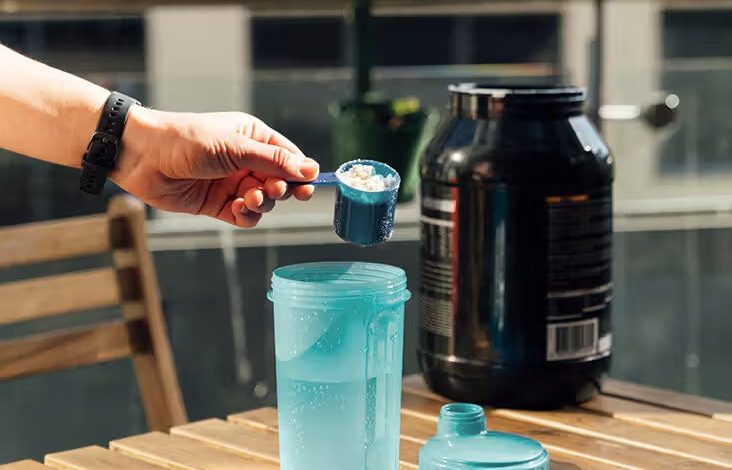Ask Teenage Boys If They Use Muscle-Building Supplements

A new opinion published in the Journal of Adolescent Health suggests that doctors in primary care, family medicine, and mental health should inquire about the use of muscle-building supplements, such as protein or creatine, from every adolescent and young adult under their care.
Compared to vitamin supplements like A, C, and folate, muscle-building supplements are linked to higher rates of death and disability in teens and are not subjected to the same testing procedures as pharmaceutical pharmaceuticals before coming on sale. Even though teens do not appear to be adversely affected by protein drinks or creatine gummies, food consumption often provides the required nutrients, negating the need for supplements.
“Use of these supplements is pretty ubiquitous for many young people, particularly boys,” stated Kyle Ganson, PhD, MSW, who wrote the commentary and is an assistant professor of social work at the University of Toronto in Ontario, Canada.
According to additional study, men are the biggest users of muscle-building supplements and are also more prone to suffer from eating issues related to muscle-building.
According to Ganson’s study, more than 80% of teenage boys and young men take a protein supplement, while less than 50% use a creatinine supplement. However, Ganson noted that doctors could not be aware of use because they don’t inquire.
A clinician should employ a harm reduction strategy that promotes reducing or altering supplement usage rather than demanding complete abstinence after inquiring about use and discovering that a teen or young adult is taking dietary supplements. Coauthors Ganson wrote.
A doctor may, for instance, evaluate the patient’s consumption of calories, fats, proteins, carbs, and vitamins and minerals. If necessary, the doctor could then reassure the adolescent that they are getting all the nutrients they require during meals. The majority of teenage males and young adults, according to Michele LaBotz, MD, medical director of the University of New England’s Master of Science in Athletic Training program in Biddeford, Maine, will not listen to a clinician warning them about the possible risks associated with supplements.
However, LaBotz, a sports medicine specialist of nearly 20 years, finds that teaching these patients that the supplements are probably a waste of money and that muscles will develop just fine with a balanced diet and regular exercise, is more helpful at lowering use.
Maintaining open channels of communication on supplements may pave the way for an adolescent to disclose their use of muscle-building steroids. Ganson stated that when teenagers no longer believe they are getting benefits from supplements, they may move on to a more hazardous product.
“It’s not one conversation and you’re done: It’s about providing support and medical monitoring,” Ganson stated.
According to Ganson, professional associations should create official clinical practice recommendations regarding the use of supplements that promote muscle growth in teenagers and young adults.
Contaminated and Dangerous Supplements
While it’s natural for any young male to desire to bulk up, athletes should be especially careful. LaBotz wrote a suggestion for the American Academy of Pediatrics for young athletes to follow proper diet and exercise regimens instead of using supplements.
Supplements for increasing muscle may have unfavorable effects if their labels are misleading. For instance, products marketed as creatinine occasionally include potentially dangerous substances like oxilofrine or deterenol, which are not permitted for usage in the US.
Pieter Cohen, MD, an associate professor at Harvard Medical School, Boston, and an internist at the Cambridge Health Alliance who counsels physicians and patients about the appropriate use of dietary supplements, says words like “proprietary,” “blend,” or “complex” on a supplement label should raise suspicions.
The US Food and Drug Administration is not permitted to evaluate the safety of dietary supplements prior to their sale to consumers, in contrast to pharmaceuticals. Additionally, supplement makers are not obligated to specify on product labels the amount of each ingredient in a proprietary blend. An estimated 23,000 ER visits per year in the US are attributed to unfavorable consequences from nutritional supplements, which can include everything from swallowing issues to heart problems.
According to Cohen, supplements that have been verified by a third party and include less than six components are generally more likely to be safe than others. Customers can use a scorecard provided by the Department of Defense to determine which supplements are safest to use.
Bryn Austin, ScD, SM, a professor of social sciences at the Harvard TH Chan School of Public Health in Boston and the director of a program that teaches medical professionals how to intervene to prevent eating disorders, stated that “American consumers are the lab rats for these products.” “This industry spends a lot of money trying to create a bubble of health for itself. Supplements that increase muscle mass can be quite hazardous and won’t make someone become the world-class athlete they’ve always wanted to be.”




